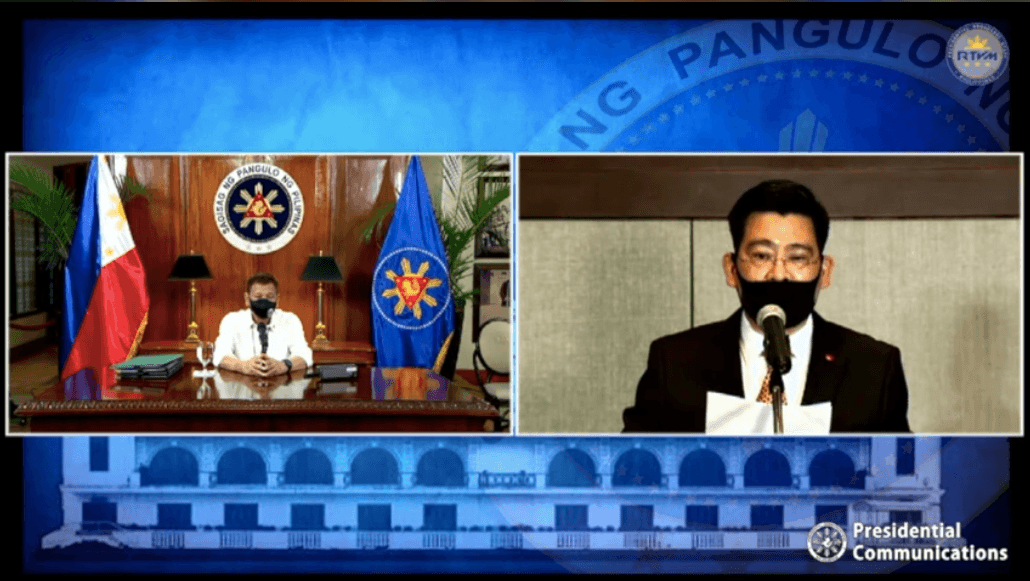SUMMARY
This is AI generated summarization, which may have errors. For context, always refer to the full article.

MANILA, Philippines – The coronavirus pandemic has ushered in yet another first for Philippine history – the first virtual presentation of ambassadors’ credentials.
President Rodrigo Duterte accepted the credentials of the following new foreign diplomats in the Philippines on Friday, June 19:
- Palestinian Ambassador Saleh Asad Saleh Fhied Mohammad
- New Zealand Ambassador Peter Francis Tavita Kell
- Canada Ambassador James Peter MacArthur
- Iran Ambassador Alireza Tootoonchian
- Vietnam Ambassador Hoang Huy Chung
The ceremony took place in two locations. Duterte was in the Malago Clubhouse inside the Malacañang complex while the ambassadors were in the Diamond Hotel in Manila.
Malago, a place used for the President’s social gatherings and informal meetings in normal times, was transformed into a presidential office.
In videos of the ceremony, Duterte is seen seated behind a heavy wooden desk, flanked by the Philippine flag and presidential standard. He wears a barong, sleeves rolled up almost to his elbows as usual. But unlike normal times, Duterte also has on a black mask, covering his face from nose to chin.
On the other side of the screen, the ambassadors take turns walking to a space between Foreign Secretary Teodoro Locsin Jr and Foreign Assistant Secretary Porfirio Mayo Jr to present their “letters of credence” to Duterte. They too, are wearing masks.
The President then formally recognizes them and says some words about the Philippines’ diplomatic ties with the ambassador’s country.
When it was Vietnam Ambassador Hoang Huy Chung’s turn, Duterte hailed Vietnam as an important neighbor, especially when it comes to promoting rule of law in the region’s seas.
Vietnam, like the Philippines, has maritime disputes with China. But unlike the Philippines under Duterte, Vietnam has been more vocal about incursions in what it deems its seas while still preserving economic ties with Beijing.
“We count on Vietnam’s continued support for our advocacy for the rule of law, peaceful resolution of disputes, and keeping the global commons – particularly in our region’s maritime space – free and open,” said Duterte, as quoted by a Malacañang press release.
Meanwhile, he called Canada an “old friend and important development partner” when he faced new ambassador James Peter MacArthur. MacArthur, in turn, congratulated Duterte for the establishment of the Bangsamoro Autonomous Region in Muslim Mindanao and the Build, Build, Build infrastructure program.
When it was new Iranian Ambassador Tootoonchian’s turn, Duterte thanked Iran Supreme Leader Ayatollah Seyyed Ali Khamenei for pardoning a Filipino national. In September 2019, the Iranian government pardoned Ernie Tamonde who was convicted in 2010 over drug charges and was initially sentenced to death.
Tootoonchian relayed Iranian President Hassan Rouhani’s invitation to Duterte to visit Iran one day.
To New Zealand Ambassador Kell, Duterte expressed his wish that the Philippines and New Zealand cooperate in developing geothermal energy and strengthening their engagement in fighting terrorism and boosting maritime security and defense.
Duterte welcomed Ambassador Saleh Mohammad as Palestine’s first ambassador after the reestablishment of its embassy in Manila last year. The ambassador conveyed warm greetings from Palestinian President Mahmoud Abbas.
Diplomatic tradition. The presentation of ambassadors’ credentials is a tradition in Malacañang. It’s an official ceremony that is a diplomatic requirement because it is where the Philippine government formally recognizes ambassadors as the official representive of their country.
During the ceremony, the ambassador-designate presents to the President a “letter of credence” which accredits them to deal with the Philippine government in a diplomatic capacity, according to a write-up on the Malacañang museum’s website.
The ceremony for resident ambassadors usually includes traditional military honors and a band playing the national anthem of their country right outside Malacañang. The ambassador them ascends the Palace staircase where he is met by the President’s senior aide. The chandeliers in the Reception Hall are lit.
The rest of the ceremony is elaborate, with a specific arrangement of officials and distance of flags, as detailed by Luis Moreno Salceno’s “A Guide to Protocol.”
Definitely, the pomp of such Malacañang events is yet another loss during the pandemic. But even amid a health crisis upending lives and routines, such traditions must continue, with a modern-day twist. – Rappler.com
Add a comment
How does this make you feel?
There are no comments yet. Add your comment to start the conversation.